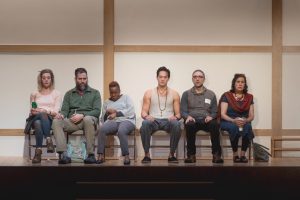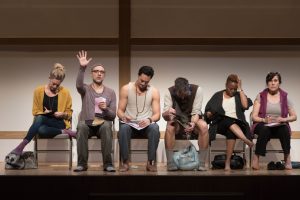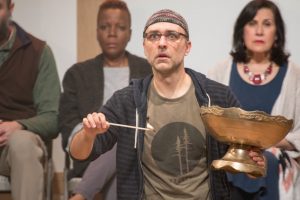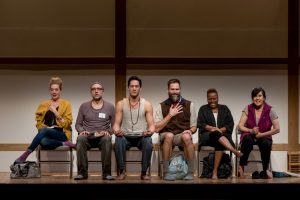YOU LEAVE SEEKING PEACE AND A PLOT
When a play comes along that is entirely different from any play that has preceded it, especially in our era of over-informative white noise and copycatting creativity, it deserves attention. Even Small Mouth Sounds — Bess Wohl’s 2016 work, now stopping at The Broad Stage in Santa Monica as part of a limited national tour — which most certainly will have quite a few people scratching their heads, wondering what it is they have just seen. No one will dismiss it out of hand because of its unfamiliarity, but some may scoff at, or be detached by, its unsatisfying resolution. Still, it comes at us looking and feeling like no other play, and provides us with the unexpected pleasure of witnessing something brand new.
Blessedly easy to relate, this Ars Nova production concerns six city folks who have come to a woodsy meditation retreat where communication must occur only by silence, unless instructed to speak by the unseen Buddhist-like facilitator (an amazing voice-over performance by Orville Mendoza). In less than two intermissionless hours, the play seeks to capture the experience of taking this two-week course, and while that may sound restrictive, it is only as restrictive as the experience itself. We don’t watch exercises — as was the case in Annie Baker’s Circle Mirror Transformation (which takes place in a community center’s acting class) — but we witness all the awkward, frustrating, and exciting tacit interchanges during rest breaks, bedtime, etc. Especially fun is watching the students as they sit in convention center-style chairs, facing us as they listen and react to the teacher.
The silences here absolutely mimic much of Baker’s oeuvre, but under Rachel Chavkin’s direction they are far more drenched with meaning. Even as we hear the life lessons spouted by a perfectly imperfect self-help guru, we get a palpable sense that real connection seems problematic, because, after all, the possibility of connection is so tied into the raison d’etre of the workshop that it almost works against itself, as anyone who has ever been in any self-help environment will tell you.
Unfortunately, even as each participant had a compelling story of their own (cancer, a child’s death, divorce, et al.), the creators intent to leave us at the end as alone and searching as the characters feels like a dramatic cop-out. Is this the new theater trend? Let the audience fill in the blanks? That’s great with Pinter and other masters of the absurd, but there’s nothing absurd here; it’s as slice-of-life as can be. Equally problematic is the styles of acting veered from beautifully naturalistic to broad, which could be an offshoot from the playwright’s intention that there is no protagonist.
Even though there’s no storytelling arc, and I found myself questioning in the end why we even took this journey, there’s much to appreciate during vignettes both enchanting and wistful. In an atmosphere that prohibits verbal communication, so much gets said about who these people are that it feels practically Chekhovian. (Even though they don’t sit around and talk endlessly about the failure of their lives, they sure do project it.) It’s a valid technique to leave some characters’ stories open-ended, but Chekhov didn’t leave the audience searching for resolution.
photos by Ben Gibbs
Small Mouth Sounds
Ars Nova prouction
The Eli & Edythe Broad Stage
1310 11th St in Santa Monica
ends on January 28, 2018
for tickets, call 310.434.3200 or visit The Broad
for tour dates and cities, visit Small Mouth Sounds





{ 1 comment… read it below or add one }
I saw Small Mouth Sounds in NY a few years ago and had a similar reaction. It seems to be part of a sub-genre of ensemble plays, including Circle Mirror Transformation, The Antipodes (also by Annie Baker), and The Wolves (by Sarah DeLappe, now playing in NY), which have become popular. In each there is a particular gathering — a retreat, a TV writers’ brainstorming session (The Antipodes), soccer practices of 16-year-old girls (The Wolves); in each, the exchanges and the silences all seemed “authentic†to me, in the sense that I felt I could have been watching a real gathering taking place. And in each, there were conflicts between characters — egos clashing, sexual one-upmanship, power plays, and so forth — that struck me as entirely plausible. But in the end the plays left me asking myself why did I bother to spend 90 or 120 minutes watching this and, as you write, “searching for resolution.â€